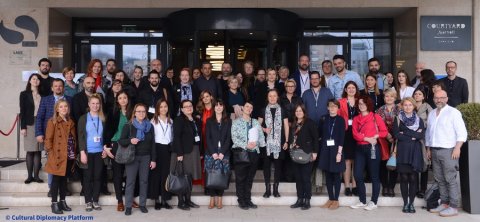New Prospects for Cultural Diplomacy in the Balkans?
The Cultural Diplomacy Platform organized a Regional Consultation meeting on 8-9 April in Sarajevo
April 30th, 2019Thirty cultural stakeholders from the six Western Balkan countries (Albania, Bosnia and Herzegovina, Kosovo, Montenegro, North Macedonia and Serbia) as well as EU institutions, cultural institutes and Member State representatives took part of the Regional Consultation meeting.
In March 2016, the Service for Foreign Policy Instruments of the European Commission launched the platform for Cultural Diplomacy. The aim of its establishment is to aid in the implementation of a new “EU Strategy for international cultural relations.”
The idea for the platform also derives from the Preparatory Action “Culture in EU External Relations” from 2013-2014. The main objective is to try and carry out activities that could enhance EU’s cultural engagement with third countries and their citizens principally by supporting and advising through EU institutions, global EU Delegations and setting-up global cultural leadership programs.
All the activeties are organized in cooperation and co-creation with local partners, involving the civil society. The main goals are to support further development of cultural diplomacy policies, activities, methodologies, tool and training programs. As well as to assist and advise on cultural diplomacy issues.
The long-term objective of this platform is to positively develop existing cultural diplomacy policies and methodologies at the EU level, increase the number of cultural diplomacy activities and to develop existing tools and make changes in the EU Strategic Partnership Agreements.
As an example of who participated at the consultation, Yane Calovski was one of the invitees because of his contribution to the cultural development in the region. In 2004 he collaborated with Hristina Ivanoska to develop a special program-based artist initiative for research and production in the field of visual arts and curatorial practices. The three main programs of activities are: Visiting Curatorial Initiative, New Project Productions and Lectures, Publications and Exhibitions which are all mediums for gathering ideas and projects with artists from North Macedonia, Europe and beyond.
The report from this year’s consultation has not yet been published so the results of the discussions and debates are not yet available for analysis. However, it is of utmost importance to recognize and report on such activities to promote the development of the platform.
From these six countries only Serbia and Montenegro are the furthest in the EU accession process and have already begun negotiations. Albania and North Macedonia are still at the beginning of accession talks, while Bosnia and Herzegovina and Kosovo are recognized as potential candidates. The EU accession status is not in anyway a factor for the development of cultural diplomacy also because the platform was developed for third countries. It is yet another way the EU is establishing its soft power.
Promoting these kind of relations may be understood as the EU having recognized great value in the cultural exchanges in the Western Balkans, which should be considered as a commendation but mostly as motivation for further progress.
Most of the countries in the Western Balkans have been dealing with reviving their regions economically, politically and agriculturally in the last years following many difficult unrests. Cultural exchanges have of course never halted but were side-tracked in terms of funding and appreciation due to other priorities. That is why the Cultural Diplomacy Platform is a great way to give a voice and a chance to the already developed and other possible developing cultural interactions in the Western Balkans.
The EU offers advisory help through different institutions and delegations to help the cultural sphere develop. Not only does that mean projects will get recognized and funded but it will give the participants a chance to stay and develop in their own region without having to seek development elsewhere.
References:
- - https://www.cultureinexternalrelations.eu/2019/04/11/regional-consultation-meeting-sarajevo-8-9-april/
- - http://presstoexit.org.mk/index.php?option=com_content&view=article&id=332:regional-consultation-meeting-eu-western-balkans-cultural-relations&catid=11&Itemid=199&lang=en
- - https://europa.eu/newsroom/highlights/special-coverage/enlargement_en





